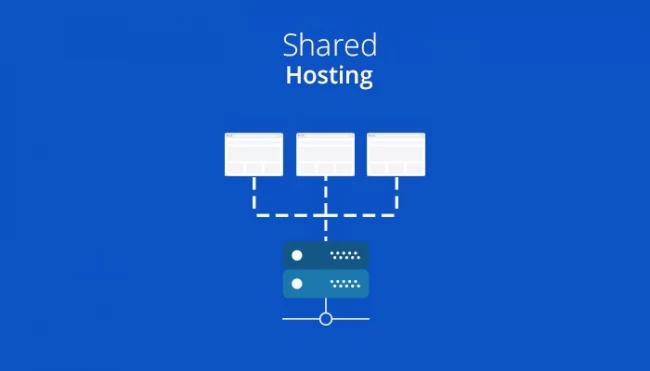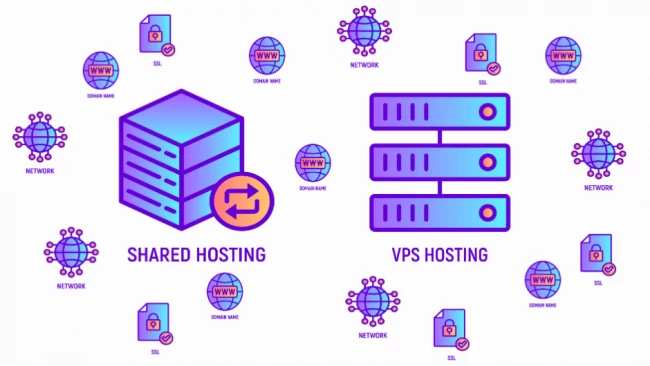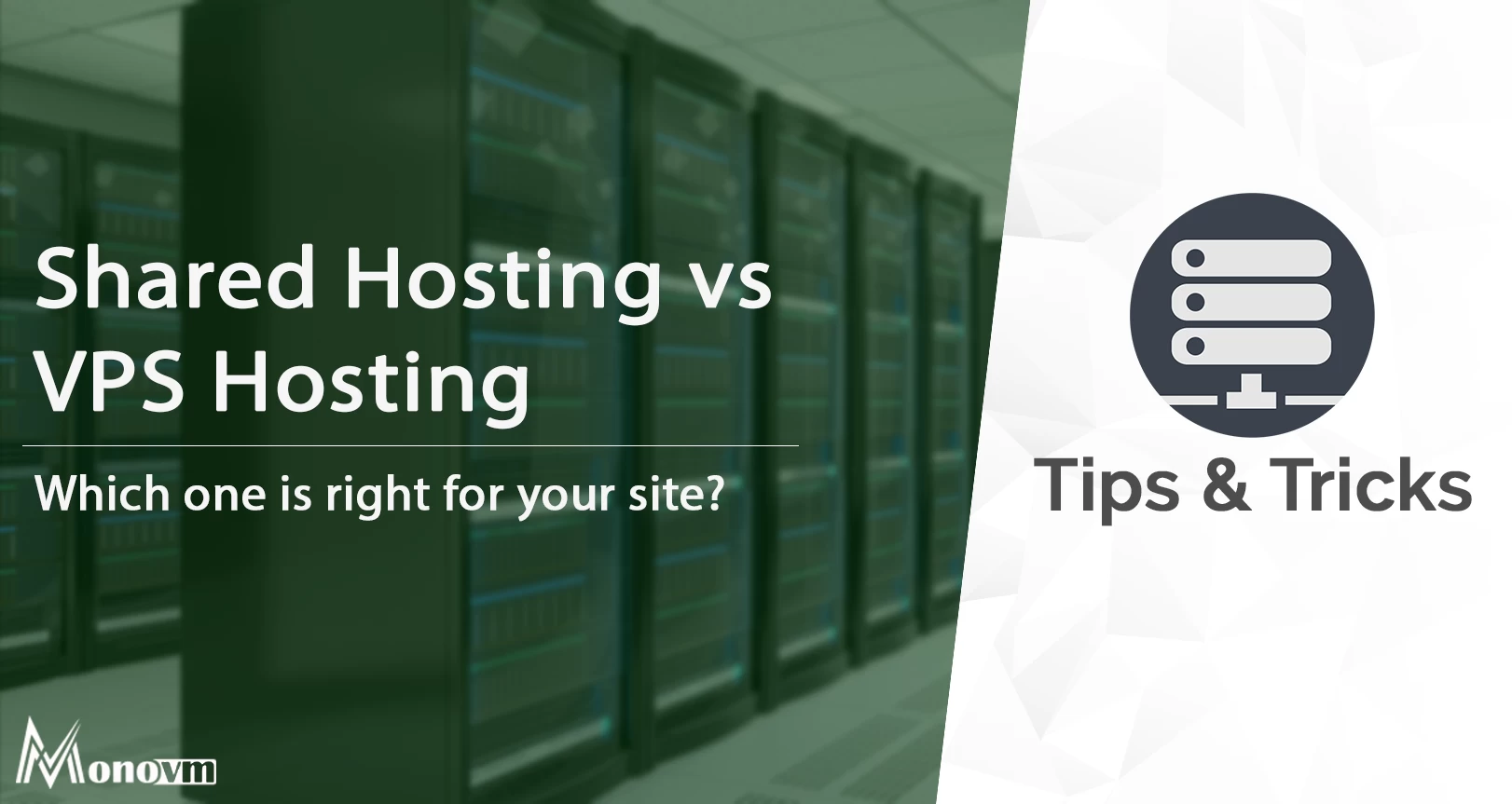List of content you will read in this article:
Choosing the right kind of hosting for your website can be a tougher job If you don't have expertise in a Technical Domain like hosting. Not only do you have to sort through dozens of different hosting companies, but you also have to choose the right type of hosting as well. There are two kinds of hosting you’ve probably come across in your search i.e. shared hosting vs VPS hosting.
These two types of hosting both have the same kind of end goal, ensuring you have a site live on the internet. However, you must choose the right kind of hosting solution for your site. By choosing it, you’ll make your life as a website owner much easier.
What is Shared Hosting?

This is the most common type of hosting every new business user starts with. Simple means multiple websites share a physical web server; it distributes a web server to operate and serve more than one website because you share the same server as other websites, you use the same database, bandwidth, storage, etc. It’s popular primarily because it’s so economical and easy to maintain.
Benefits of Shared Hosting
Above all else, affordable pricing is the main draw here. our shared hosting plans, for example, start at just $6.99 per month. This makes it a clear option for businesses or individuals that want a website but who don’t have a huge budget at their disposal.
Another reason people like it is because also that it’s very hands-off in terms of technical maintenance. Your shared hosting provider assumes this responsibility for you, so you don’t need any specialized skills to operate and maintain your site. Even better, thanks to incredibly user-friendly content management systems like WordPress, most people can get by on a shared hosting plan with virtually no programming skills.
If you have a small website and only anticipate a minimal amount of traffic (e.g., a maximum of 500 visitors per day), you may not need anything greater than shared hosting.
Limitations of Shared Hosting
With shared hosting, you can run into issues with site performance. Since you’re sharing the server environment with other users, if one of those sites is having a massive traffic day, it could negatively impact your site. The same goes for your site. If you’re experiencing a high volume of traffic, there’s a higher chance your site could go offline or perform poorly.
With shared hosting, you’re limited by the initial server hardware and software configuration. You can customize by installing your own CMS or make small changes via the control panel, but that’s about it. Advanced users or site owners who require unique hardware and software setups will want to look for other hosting forms. With a shared hosting service, there are server storage and bandwidth limits. If your site is growing quickly in terms of size or traffic volume, you may need to upgrade your hosting package.
What is VPS Hosting?

It is significantly more robust, offering tons of features you won’t find with shared hosting. While you technically still share a server, you get a dedicated slice of it that’s just for you. A virtual private server (VPS), also referred to as a virtual dedicated server (VDS), is a virtual server that appears to the user as a dedicated server and serves multiple websites.
Benefits of VPS Hosting
VPS hosting is like a hybrid between shared and dedicated hosting. For some website owners, this will be the perfect hosting setup.
Here are some of the most significant benefits of using VPS hosting.
1. High Levels of Performance
With VPS hosting, you have immediate access to a greater level of server resources. So, if you have a large or growing site, you’ll be able to support a higher volume of users without a decline in performance. Plus, since your hosting environment is virtualized, it’s more isolated from other sites on the same physical server. This makes it so other sites will not affect the performance of your site.
2. Security
VPS hosting offers you higher levels of security than shared hosting. Since your hosting environment is virtualized, you’ll be isolated from other sites that have space on the same physical server. Virtualization technologies have a very high-security level, so other sites on the server will not affect your site in any way.
3. Scalable
it is flexible, If you’re experiencing a higher traffic volume than normal, you can simply scale up your server resources. Since you’re not confined to a single physical server, it’s easy to add more server resources. It’s near impossible to find this level of flexibility and scalability with shared hosting.
4. Customization
With VPS web hosting, you’ll have access to more server customization options. You’ll also get root server access, which gives you greater server control. A VPS server behaves more like a dedicated server than a shared server, giving you more power, freedom, and control.
Limitations VPS Hosting
However, VPS hosting isn’t without its drawbacks. Since it’s a more powerful hosting form, it’ll be more technical to manage your server environment effectively.
Here are the two biggest drawbacks to VPS hosting that might make you consider using a different form of hosting.
1. It’s More Expensive
VPS hosting will be more expensive than shared hosting; there’s no doubt about it. Since you’re getting access to more server resources, the costs will increase as well. Generally, you’ll only have to pay for the server resources you use, however, which makes it very cost-effective, even while paying a higher monthly rate.
2. It’s More Technical in Nature
With VPS hosting, you generally need a higher level of technical skills to manage your server the right way. However, depending on your hosting provider, you might also be able to sign up for a managed VPS server. A managed hosting environment means that the hosting provider’s technical staff will help to maintain, upgrade, and optimize your server environment for you.
So, Which One Should You Choose?

Shared and VPS hosting share some common similarities, however, they are different in many ways. Before you make your final decision about the hosting option, it's essential to look at the differences between VPS and shared hosting. Here are some of the differences between them
Operating System - With a shared server, you also share your operating system with all other websites. However, with VPS, you have a full-fledged operating system that you can reboot independently from others because your website will sit on its virtual partition.
Technical Skill - Shared hosting does not require any technical skill because your hosting provider will fully manage your server. Alternatively, with VPS hosting, you need to have some technical skills because you may need a dedicated system administrator to manage the server and ensure that it is functioning consistently and efficiently.
Control - With shared hosting, you are given no control over your server; however, you will have all the control you need with VPS hosting. In other words, when you have control over your server, you will be given root access that allows you to install scripts and software anytime you want.
Price - Shared server is the most economical option because you essentially share the cost with other websites on your server. Alternatively, VPS is more expensive, but not by much. However, the benefits that come along with VPS more than makeup for the additional costs.
Scalability - Shared option does not offer any scalability, meaning that you cannot just add resources without moving to another plan. However, with VPS hosting, you can easily scale your resources when your business grows.
Shared Server - With shared and VPS, you will share your server with other websites. However, you will share your server with as many as a thousand other websites with shared hosting. Alternatively, with VPS, you will share your server with only a handful of different websites.
Resources - The resources with shared servers are on a first-come, first-served basis, meaning that your website is not guaranteed resources. On the other, with VPS hosting, your website is guaranteed an allotted amount of dedicated resources exclusively for you.
In short, both types of hosting are quite different, yet they have some things in common. It may be possible to save money by using shared hosting, however, your website's performance may suffer without VPS hosting. If you still are confused, contact your hosting provider to see what plan would best fit your website.
Final Words
In this article, we presented two different types of hosting services and compared their advantages & disadvantages. Looking at these, you can better decide on what service is right for you between shared hosting vs VPS hosting. If you have any questions or suggestions, please leave them in a comment down below.
This article is also applicable to get the difference between Web Hosting vs VPS Hosting too.
People Are Also Reading:
